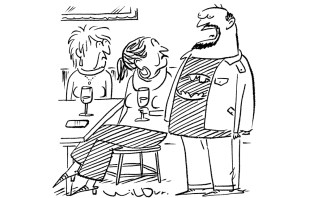
We were almost having a symposium and I was invited to define Toryism in one sentence. I replied that one book would be easier: the late Roger Scruton’s On Hunting, which ought to be subtitled: ‘From Horse-Shit to Heaven: the Search for Love, Order and God.’ ‘But what if you leave out God, and therefore heaven?’ said one fellow: ‘What would be left?’
‘What indeed. Many learned Tories – Dr Johnson, Salisbury and Quintin Hogg being obvious examples – would have given a simple answer: nothing.’
Those of us who have to do without God and yet avoid the abyss of nothingness can only fall back on eupeptic pessimism. Edward Fitzgerald’s Omar points the way: ‘A jug of wine and thou.’ That made us think about wine and philosophy, a suitably Scrutonian juxtaposition. You can enjoy wine without being troubled by deep thoughts – or any thoughts, for that matter, as countless millions of Toby Belches have discovered over three millennia. But it is also possible to regard a glass of wine as a Hegelian synthesis. Think of the number of theses and antitheses which have come together in the dancing dialectic to create that final product. The magic of terroir, the long maturation of experience and tradition and the increasing influence of science, which means that there are fewer and fewer bad years, while other regions improve their viniculture. This is just as well, given the world’s increasing demand for the stuff. Leaving aside its use in many religions, drinking wine is a secular sacrament.
My new friend Nicola Bodano is a one-man synthesis. For years, he has been interested in oxidisation. At what point does contact with the air cause wine to deteriorate? There is a widespread assumption that good red wine needs some exposure to oxygen and ought therefore to be decanted, while good white wine can also benefit. But that would apply to fine wines in their maturity. As for really old wine, it is more a matter of open and pour. Most oenophiles assume that an ancient bottle will also have a very brief life.
Most oenophiles assume that an ancient bottle will also have a very brief life
Nicola disagrees. At least for mature wines, he thinks that decanting is often unnecessary. To publicise his views, he set up ‘No decanting’, whose members meet in a club and enjoy the gastronomy while assessing some excellent bottles and inter alia discussing Nicola’s theories.
He is from Sardinia and has applauded for many years as the standards of Sardinian wine have steadily improved. I will report on some of his discoveries at a later date. Recently, however, we were at the other side of Italy: wines from Puglia and Abruzzo. In these cases, the question of decanting did not seem relevant. These were young and fresh wines ready to face the world and bring pleasure.
We started with a dry Moscato: an excellent aperitif which was equally good with a caciocavallo cheese. Trebbiano d’Abruzzo followed and then a Montepulciano d’Abruzzo 2021, a big wine which will certainly keep. The same was true of a Primitivo Riserva and a Poggio Negromaro.

These bottles made me think of that vastly civilised region: landscape, architecture, the Adriatic; the kitchen and the wine cellar. Lecce is one of the most attractive small Italian cities. In 1944, an American general was in charge of the Salento area. Charles Poletti, clearly of Italian origin, was not satisfied with Salentino reds, which are usually very good. He wanted rosé. The local proprietors followed instructions: the Yanks drank Four Roses Bourbon. Leone de Castris went on to produce Five Roses Salentino, and the other evening we drank a 1946. It ought to have been long dead. Yet it still had some structure. We did indeed open and pour – but it lasted for the necessary few minutes. A fascinating experience.







Comments